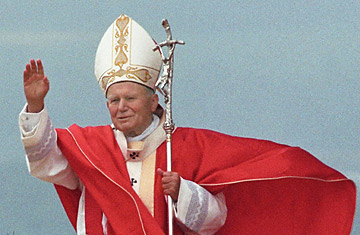
Pope John Paul II waves to a crowd in Gniezno, Poland, during a visit to his native country in 1997
(8 of 8)
Whatever the political maneuvers one makes with it, forgiveness is actually a profound transaction. It is the working model of the human relationship with God. It is not merely God who forgives man, but in some sense man who also forgives God, or forgives life, for its cruelties and injustices. The essence of the process is dynamic, for forgiveness makes change possible—spiritual change and, as the American South proves, social change.
The Old Testament view of forgiveness was contained in a verb that dominates its penitential literature, the Hebrew word shuv, meaning to turn, to return.
The doctrine implies that man has the power to turn from evil to good, to change, and the very act of turning will bring God's forgiveness.
Those who do not forgive are those who are least capable of changing the circumstances of their lives. In this sense, forgiveness is a shrewd and practical strategy for a person, or a nation, to pursue. It is the implacable, retributive tribes, like those of Northern Ireland or Lebanon, that find themselves back-watered, isolated, perishing hi their own fury.
The psychological case for forgiveness is overwhelmingly persuasive. Not to forgive is to be imprisoned by the past, by old grievances that do not permit life to proceed with new business.
Not to forgive is to yield oneself to another's control. If one does not forgive, then one is controlled by the other's initiatives and is locked into a sequence of act and response, of outrage and revenge, tit for tat, escalating always. The present is endlessly overwhelmed and devoured by the past. Forgiveness frees the forgiver. It extracts the forgiver from someone else's nightmare. "Unless there is a breach with the evil past," says Donald Shriver, "all we get is this stuttering repetition of evil."
It is difficult to imagine a world willing to follow John Paul's example, ending that stuttering repetition any time in the near future. Too many societies are spiritually incapable of it. Marxism, the political doctrine under which about one-third of the world's population lives, is a stolidly unforgiving system. Stalin did not forgive the Kulaks for being a little too independent, but liquidated millions of them. The Chinese did not forgive their bourgeoisie after the 1949 revolution, but demoralized and decimated it. The Prophet taught that "God is with those who restrain themselves," but Ayatullah Khomeini's Shi'ite regime is in a state of religious intoxication and madness that is unlikely to be overtaken by tolerance.
Forgiveness is not an impulse that is in much favor. It is a mysterious and sublime idea in many ways. The prevalent style in the world runs more to the high-plains drifter, to the hard, cold eye of the avenger, to a numb remorselessness. Forgiveness does not look much like a tool for survival in a bad world. But that is what it is.
— By Lance Morrow. Reported by Barry Kalb and Wilton Wynn/Rome
